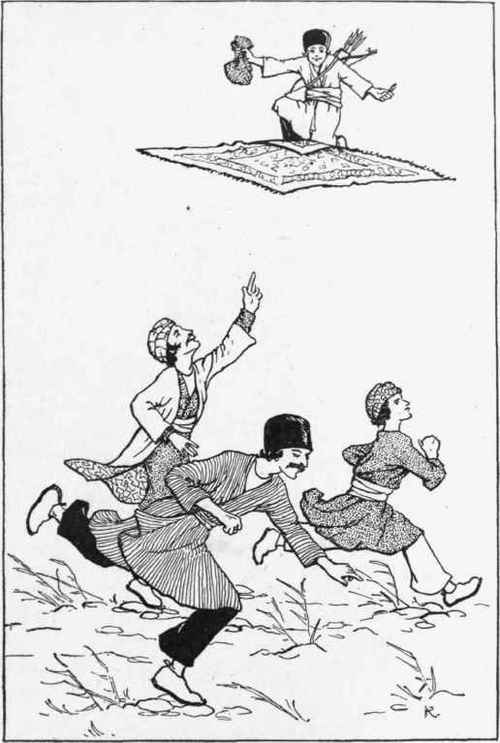The Story Of The Magic Bird. Part 3
Description
This section is from the book "Persian Tales", by David Lockhart Robertson Lorimer, E. O. Lorimer. Also available from Amazon: Persian Tales.
The Story Of The Magic Bird. Part 3
"I am the son of the Qazi of a town," said he. "Excellent," replied they. "Now, Qazi, just apportion these things for us." "Bring them here, then," said he. Now he perceived that these men were the sons of the very man who had been his mother's companion, and from whom he and Ahmad had fled.
They brought the articles, and he saw that they were a bag, a carpet, and an antimony vial. "Very good," said he, "now what is the particular virtue of each of these?" "The peculiarity of the bag," said they, "is that if you put your hand into it and pray you will find in it whatsoever you wish for; and if you sit on the carpet and say: 'O Your Majesty King Suleman, carry me off,' it will bear you off to wheresoever you wish; and as for the antimony vial, when you paint the antimony on your eyelids, then wherever you may choose to go no one will be able to see you."
"Very good," said Mahmad, "now do you know what you must do?" "No," said they.
"Well," said he, "I have a bow and arrow here; I will shoot the arrow and you three will run after it, and whoever first brings it back will be the owner of all three articles. The brothers all agreed to this, saying: "Let them all belong to one; it will be better so." Mahmad then placed the arrow against the string of his bow and shot it with all his strength, and all three started off at full speed, each jealous of the other, and each thinking: "I must get back first and win all three things."
But while they ran off after the arrow, Mahmad sat down on the carpet and rose up into the air, saying: "Take me to the Castle of the Lady," and he sped away through the air. When the three brothers saw him flying off they beat their heads and said: "Now, do you see what we've gone and done? We have told the fellow the peculiar properties of the bag, the carpet, and the vial, and now he has gone off and taken them with him!" But from up in the air Mahmad shouted to them: "Don't beat yourselves! The right man has come to his rights. It was your father who forced my brother and me to flee for our lives."
Straightway he arrived at the foot of the Castle and hid away the things and went up to the gate. The Lady of the Castle saw him coming and said: "So you've come back, have you?" "Yes," said he, "and I've brought something for you. It wasn't possible to bring it here; we must go and look for it together." The woman's greed was awakened, so she got up and went with him, and they took their seats on the carpet. Mahmad prayed: "Take us to the foot of the Haur Tree1 in the middle of the sea." Immediately they rose up and travelled through the air till they came to the Haur Tree in the middle of the sea; God alone knows how many years' journey it was distant.
When the Lady of the Castle found herself beneath the tree in the middle of the ocean she said: "This is all very well, but I have nothing with me here." Mahmad promptly answered: "I'll marry you. You belong to me now." "Very good," said she, and he married her. They remained there some days, and everything they had need of they obtained from the bag.
"Well," said she, "now that I belong to you, tell me what is the special property of these things." And Mahmad so lost his common sense that he behaved like a fool and told her all about each of the things. "That's splendid," said his wife, but to herself she said: "May my woes descend on your head! I must escape and leave you here until you die." Presently Mahmad went down a well, and took off his clothes to have a wash. As soon as he had disappeared into the well the woman sat down on the carpet and said: "Take me back to my own Castle!" and up she went into the air.
1 "Haur " may mean "island "; in that case the Haur Tree would only be the "Tree in the Island."

Mahmad sat down on the carpet and. rose up into the air.
Now when Mahmad looked up and saw her, he beat his head and cried out: "Why did I tell her?" "By the soul of your father," answered his wife, "you will stay where you now are till you die, for you brought me here by craft!" Straightway she arrived at her own Castle, but Mahmad remained behind in great distress and confusion, crying out: "O God, what am I to do? There is no road to get away by, and there is no food here to keep me from dying," and he wept so much that he fell asleep.
He dozed for a little, and then partly woke up, and found that two pigeons had come and settled on the tree above his head. They said: "Didu, Didu,"1 and then one of them said: "My dearest sister, do you know who this man is?" - "No." "This is Mahmad," said the first, and then she went on and told her sister all about him, adding: "And now, do you know how things can be put right for him?" - "No, I don't." "Well," said the first pigeon, "if he will wake up so that I can tell him what to do, and if he will act accordingly, his affairs will come right, but if he goes on sleeping he will just have to stay here till he dies."
Mahmad heard and said: "Sister, I pray you, in God's name, tell me what to do!" "Well," said the pigeon, "do you see this tree?" - "Yes." - "All right, you must wrap the bark of it round your feet, and you will then be able to walk over this sea, just as if you were going over dry land. Take also a twig of the tree, and if you strike any person with it and say: 'Haush!'2 he will turn into a donkey, and if you strike him with it again and say: 'Adam!'3 he will become a man again. Lastly, you should take some of
1 "Didu" in the Bakhtiarl language means "sister."
2 "Haush" probably means "animal."
3 "Adam" means "man," "human being." the leaves, and if you draw them over the eyes of a blind man he will recover his sight."
When the pigeon ceased speaking Mahmad woke up entirely, and the birds flew away, but as they went one of them said: "O man of little patience! I know another thing, but you gave me no chance of telling it to you."
Continue to:




